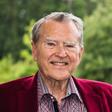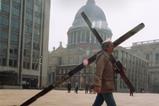Writing on his 90th birthday, RT Kendall pleads with Christian leaders to return to orthodox doctrine
One of my heroes, the Jewish psychiatrist and quadriplegic, Dr Charles Krauthammer, used to say: “You betray your whole life if you don’t say what you think – and you don’t say it honestly and bluntly.”
Having been given the privilege of sharing a candid word on my 90th birthday to the Church in Great Britain, I speak as an exceedingly grateful man. My debt to England and the Church there is incalculable. I owe my best education, my ministry, the upbringing of our children and my closest friends to your nation. Most of my adult life was spent in the UK. If only I had acquired a posh English accent, I could make an extra $10,000 a year in America!
My wife, Louise, and I still miss butter chicken and rogan josh almost as much as an evening at the Royal Albert Hall. Not to mention British humour, English mustard, Stilton cheese, Marmite, a good newspaper, Sunday roast, watching parliament, listening to classical music on BBC Radio 3 and free medical care!
Memories of England
Our family flew into Heathrow Airport on 1 September 1973 and lived in Headington, Oxford for three years. I was invited to preach at Westminster Chapel in the autumn of 1976 and became their minister for exactly 25 years. I came to Oxford as a five-point Calvinist but left as a four and a half-point Calvinist (Jesus died for everybody). I came to Westminster Chapel as an anti-charismatic and left as an anti-anti-charismatic. The only book I had written before arriving in the UK was an unpublished work about my old hobby, bonefishing.
A seismic change began in me at a restaurant in London’s Chinatown. As we were waiting to be served Peking duck, Charlie Colchester, a member of Holy Trinity Brompton (HTB), asked Lyndon Bowring and me: “Have you guys heard of this Toronto thing?” We had not. He talked about people falling to the floor and laughing after being prayed for. I was sure this could not be of God or it would have come to Westminster Chapel first!
Some of the greatest evangelists and preachers have been largely uneducated people
Later, HTB’s Ken Costa kindly asked for my opinion on what became known as the Toronto Blessing. I tried to warn him. He had not thought of convincing me, but as he described what was going on, I was shaken rigid. As he shared, the glow on his face convicted me that I was on the wrong side. Having publicly warned the members of Westminster Chapel against this new charismatic movement, I later told them that I had been wrong. It cost me friends and countless preaching opportunities but, next to having Arthur Blessitt preach for us, my affirming Toronto as an example of the “foolish things that confound the wise” (see 1 Corinthians 1:27) was the best decision I ever made at Westminster Chapel. We also became like a sister church to HTB, enjoying close relationships with past leaders Rev Sandy Millar and Rev Nicky Gumbel.
There is so much to be thankful for. After my retirement from Westminster Chapel, Canon Andrew White enabled me to have a friendship with Yasser Arafat. For several years, I was invited by Rev Colin Dye to spend six months in London preaching at Kensington Temple. I am still blessed to travel back to the UK two or three times a year.
The Church in Britain is showing phenomenal growth in many places. The admitted need for both the word and Spirit is on the increase. The best Christian songs still come out of the UK. Premier Christianity regularly describes extraordinary conversions and the unusual ways God is at work.
I never dreamed I would reach the age of 90. I waited until I was 80 to write a book on finishing well, called It Ain’t Over Till It’s Over (Charisma House). You are supposed to gain wisdom as you age, but Shakespeare’s King Lear demonstrates that there is no fool like an old fool! So, I risk being justly charged with this in what follows.
I will come now to what I must admit does sadden me – in my opinion: the apparent spiritual decline of the Church in the UK.
Disquieting decline
My disquiet can probably be summed up by quoting a conversation I had with a well-known church leader. He told my wife, Louise, and me that the great Reformation of the 16th century was a mistake. He is not alone in this opinion.
I believe the seal of God was on reformers such as William Tyndale, John Wesley, George Whitefield and Charles Spurgeon. They all echoed justification by faith alone. The same can be said of the great hymn writers Isaac Watts, Charles Wesley and John Newton. All that I have lived for assumes that Martin Luther rightly interpreted the book of Romans, especially Romans 4. He understood that just as righteousness was put to Abraham’s credit only by believing the promise, so righteousness is also put to our credit by believing the gospel. It is faith plus nothing. Had Luther given in to the teaching of faith plus works, there would never have been a Reformation in the 16th century. It was this teaching that turned the world upside down.
It was almost 70 years ago – 31 October 1955 – when a supernatural experience I’ve written about elsewhere deeply impacted me. Immediately, the book of Romans became a new book for me. I initially thought I had discovered something new, that I was the first to understand that I am eternally saved apart from works since Paul! But when I later found out what Martin Luther had discovered for himself, I realised I had actually tapped into what is pure truth.
The Reformation in Germany became the Reformation in England. Believing that the William Tyndales of this world had got justification by faith alone right, I travelled to England to study the nature of saving faith at Oxford in detail. It is what I subsequently preached at Westminster Chapel. Faith alone in Christ alone is what every single book I have written is based upon and what I would go to the stake for.
Faith alone in Christ alone is what I would go to the stake for
When I was a student at the Southern Baptist Theological Seminary in Louisville, Kentucky in the 1970s, I was taught what’s often called neo-orthodoxy. This was camouflaged orthodoxy but far from sound. My main professor, the late Dr Dale Moody, personally knew three of the most influential neo-orthodox thinkers: Karl Barth, Emil Brunner and Paul Tillich. Dr Moody taught what was called process theology (a type of panentheism), now often known as open theism.
One upshot of neo-orthodoxy is that the need to win the lost to Jesus Christ was utterly gone. Winning the lost was never a part of neo-orthodoxy. Neo-orthodoxy was essentially universalism. As for the Bible itself, the most that could be said about it was that the Bible ‘contained’ the word of God. But nobody could say for sure which part of the Bible was God’s actual word. This was accompanied by teaching which said the New Testament miracles never really happened.
When I arrived in Oxford in 1973, so many Oxford dons taught much the same thing as I had been taught in Louisville.
The trickle effect
When pastors have been trained in this way, it inevitably filters into churches. I fear we are seeing the fruit of this, as now lay people are questioning the reliability of the Bible, fewer are taught that people need to be saved and much less that eternal punishment is biblical and therefore true.
No one enjoys believing in hell. Many run to the teaching of annihilation (that one consciously ceases to exist after death). People are sadly ready for teaching that does not uphold the need for people to be saved in order to go to heaven and not hell. Has this absence of teaching of the fear of God caused the Church to flourish? No, it has not.
In the late 1990s, a well-known friend of mine shared that he was bringing a Canadian professor to London to make the case for open theism. Open theism teaches that God does not have a sovereign will of his own independent of us; he does not know the future and he leans on us to help him decide what to do next. My friend assured me that it was to be a debate. There would be other speakers. I immediately did something I have never done before – or since: I asked to be one of the speakers. “Of course,” he said. But he withdrew the invitation just before the meeting.
The truth was that it was not a debate at all. He wanted open theism to become widespread. The Canadian professor took questions from the audience. One was: “If what you teach is true, could God lose in the end?” The professor was speechless for a moment. After looking at the ceiling and the floor, he answered: “Yes, that is possible. But I think God will win.”
St Augustine said: “One who is not prescient of all future things is not God.”
Open theism has widely influenced Christianity in America – and many Christian leaders in Britain too. Although most people may not have heard of this term, many have gradually and unwittingly accepted a flimsy view of scripture.
Jesus claims he is the only way to God, but non-Christian religions are outgrowing Christianity in Britain. The consequence is that the Church is in possibly the worst shape it has been for a long time.
Wake up!
I have a sermon called ‘What they didn’t teach me in seminary’. This list includes how to lead a soul to Christ, the need for the Holy Spirit and the importance of the fear of God.
Although there are some sound Bible colleges in Britain, I rarely recommend seminary anymore. Why? Because one cannot truly understand the Bible by critical examination alone. Our pride, aided by Satan, will tempt us to think we can understand the Bible apart from the Holy Spirit. It is only the inner testimony of the Holy Spirit that fully convinces someone that the Bible is the word of God.
God can more effectively use uneducated men and women who believe the Bible uncritically. One of my earliest mentors, Rolfe Barnard, who was himself highly educated, used to say: “One day someone is going to come along and pick up the Bible and believe it and put the rest of us to shame.” Some of the greatest evangelists and preachers have been largely uneducated people. Peter and John were bold, fearless and highly effective, despite not having been to rabbinic school. This startled the Sadducees. But they also noted that Peter and John “had been with Jesus” (Acts 4:13). That was enough.
Many have gradually and unwittingly accepted a flimsy view of scripture
I believe that the next thing to happen on God’s calendar is not the second coming of Jesus but the awakening of the Church just before the second coming. I have great hope for the future. But I doubt that there will be superstars in the next great awakening. It will be led by ordinary people who simply know their Bibles and pray a lot.
Much of the Church, on both sides of the Atlantic, is spiritually asleep. And we don’t know we are asleep until we wake up! Are we asleep? We do things in our sleep – such as dream – that we do not do when awake. There is virtually no outrage today over what once offended us. We hate the sound of an alarm.
How well do you know your Bible? How much time do you spend alone with God each day? Matin Luther prayed for two hours every day. So did John Wesley. Yet a major magazine poll revealed that the average church leader in the US and UK has just four minutes a day of quiet time.
My last word is this: If you are in the minority but trust in the Bible, stick to your guns. Don’t give up.
Dear British reader, I ask on bended knee: Bear with me. I will pray for you that you might accept this word as a wake-up call from an American who respects you, looks up to you and loves you sincerely.







































1 Reader's comment